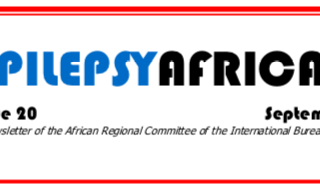Epicare ERN launch series of educational webinars
Epicare ERN has launched a series of educational webinars with #epilepsy related topics presented by internationally renowned experts. The webinars are scheduled for the third Thursday of the month at 4pm GMT. The online seminars are free to attend but require previous registration. 2020 Webinar Schedule [...]
Epilepsy Africa News – Issue 21
Chairperson & Editor’s message It is with excitement that we are closing this year 2019. AREC is excited with new and potential that this region will working on in 2020. As was promised in the last edition of our newsletter we indicated that we will be [...]
International Epilepsy News – Issue 3, 2019
As we publish this issue of IE News, we come close to the end of another year at IBE. It is only on looking back that we can see how much has been achieved and how busy we have been since January 2019. In the last [...]
Epilepsy Africa News – Issue 20
Chairperson & Editor’s message Welcome to this 20th edition of Epilepsy Africa and a very warm greeting from all over our beautiful continent. It is with joy that we share highlights of Epilepsy work happening in Africa that our affiliates have been doing across the continent. [...]
Established in 1961, the International Bureau for Epilepsy (IBE) is an international organisation for national epilepsy organisations (IBE chapters) that exists to provide support for a strong global network, encourage the development of new chapters in underserved areas of the world, and to encourage communication and collaboration among all members so as to meet our mission and vision.
Our members are patient/family focused and driven organisations and we work collaboratively with our professional and government partners worldwide.
Our strategic priorities are to ensure that epilepsy is
recognised as a health priority worldwide; that the human and civil rights of people with epilepsy are enhanced and protected wherever they might live; that people with epilepsy are empowered to maximise quality of life; and that research into prevention, treatment, care and consequences of epilepsy are promoted.
We work to achieve these priorities through a range of programs including:
- Public Information and Health Education
- Advocacy
- International Best Practice Exchange
- Helping Build Communities of Care
Sign Up to the IBE Newsletter
What is Epilepsy?
Epilepsy is one of the most common serious diseases affecting more than 50 million people globally. There are many difference causes for epilepsy including genetic disposition, head trauma or brain tumour.
Epilepsy affects almost every aspect in the life of the person diagnosed with the disease. For many people with epilepsy, the stigma attached to the disease is more difficult to deal with than the disease itself.
People with epilepsy have a 3-6 times greater risk of premature death. Many of the deaths from epilepsy could be prevented with appropriate medication and treatment.











